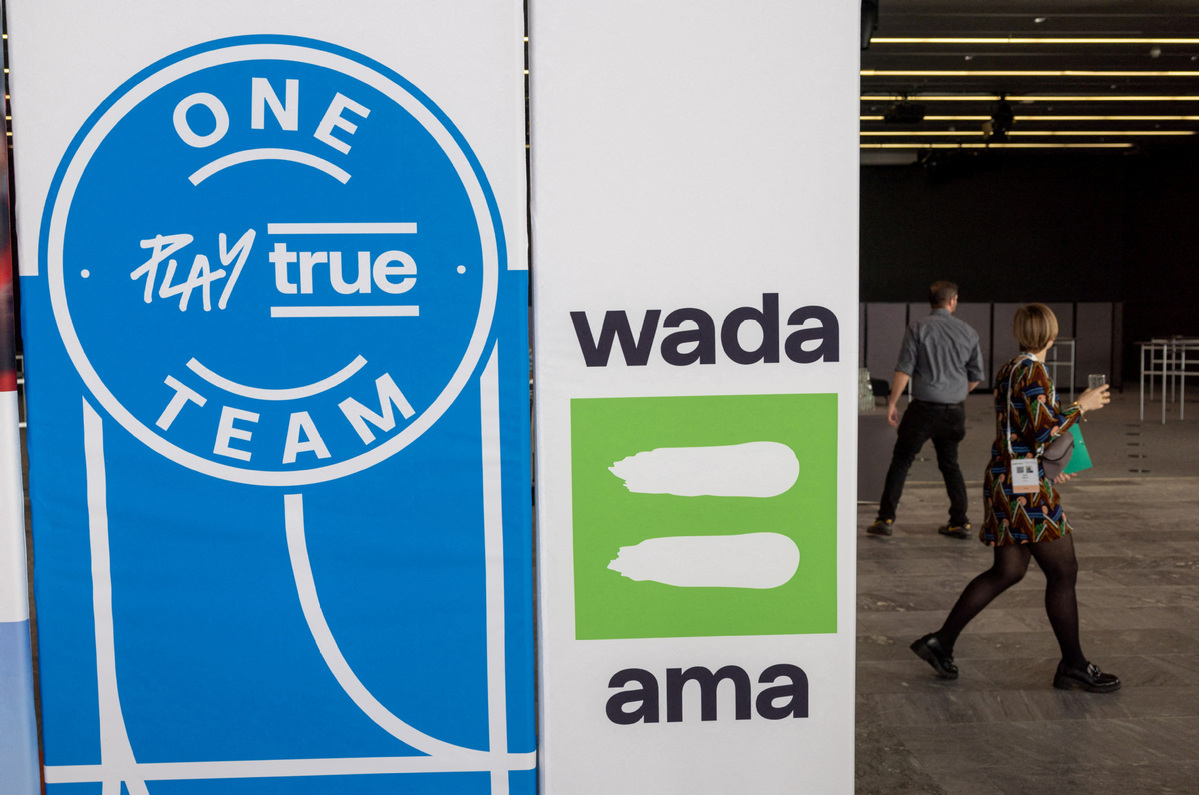
This file photo shows a WADA logo at the World Anti-Doping Agency Symposium in Lausanne, Switzerland on March 12. [Photo/Agencies]
China's anti-doping watchdog has called for an independent investigation into the United States Anti-Doping Agency's cover-up of drug rule violations after the international governing body for clean sports accused the USADA of serious breach of the global anti-doping code.
In a statement released on Wednesday, the World Anti-Doping Agency revealed that since 2011, there have been at least three cases where US athletes who had violated anti-doping rules were exonerated by the USADA and allowed to keep competing in exchange for acting as "undercover agents" and gathering information on other doping offenders.
WADA said it had never signed off on such an arrangement and wasn't aware of the USADA's practice until 2021. It instructed the USADA to immediately revoke the arrangement, WADA said.
In one of the cases, an elite-level athlete who competed in an Olympic qualifier and international events in the US admitted to taking steroids and erythropoietin enhancing drugs, but was still allowed to continue competing until retirement.
The case was never published, the results never disqualified, the prize money never returned, and no suspension ever served, WADA said, adding that it is hypocritical on part of the USADA to accuse other anti-doping organizations of not following the rules.
On Thursday afternoon, the China Anti-Doping Agency released a statement saying the USADA's practice blatantly mocks the principle of fair play in sports, severely damages the rights and interests of clean athletes, and shows a serious lack of transparency in the USADA's anti-doping work.
Not prosecuting doping offenders in exchange for information is, in effect, a cover-up of anti-doping rule violations by the USADA, the Chinese agency said, calling for an independent probe and seeking full disclosure of relevant cases.
It was the third statement issued by China's anti-doping watchdog this week, urging the US to drop its double standards when dealing with cases involving its own athletes and those from other countries.
Earlier on Thursday, CHINADA called on the International Testing Agency to intensify its monitoring of US athletes, especially those competing in track and field events, and rebuild global trust, while citing the case of Olympic sprinting star Erriyon Knighton who tested positive for trenbolone, a banned performance enhancing steroid, during an out-of-competition test in March.
Knighton, 20, was unilaterally exonerated by the USADA and allowed to represent the US at the Paris Olympics. He became a finalist for the men's 200m race after topping the third semifinal heat on Wednesday with a time of 20.09 seconds.
In a statement released on Thursday morning, China's anti-doping watchdog said the case has been widely reported by the media at home and abroad, which prompted the USADA to issue a public statement claiming that trenbolone is a common contaminant in the US.
Hundreds of positive tests for trenbolone have taken place worldwide in recent years, but only US athletes have escaped sanctions based on the USADA's investigative findings and claims of meat contamination, the Chinese agency said.
However, while Knighton tested positive for trenbolone, the USADA decided that no ineligibility would be imposed on him, saying the positive result was caused by the consumption of contaminated meat, CHINADA said in a statement issued on Tuesday.
Knighton's case has once again put doping incidents in the US in the spotlight. Such incidents are far too common in US athletics, and the USADA's handling of these cases has been inconsistent and questionable, CHINADA said.
In another case in April, US track athlete Aldrich Bailey tested positive for ostarine, an anabolic agent that helps with muscle growth, fat loss and testosterone regulation, during an out-of-competition supervision.
Even though ostarine is not a common contaminant, the USADA ruled that the positive result was due to contaminated neoprene hamstring sleeves commonly used by athletes.
Given the USADA's repeated disregard for procedures and standards, there is reason to suspect that the doping problem in US athletics is systemic, and therefore the positive cases need continuous investigation and monitoring, CHINADA said in Thursday's statement.
It strongly urged the ITA to intensify its testing of US track and field athletes and called on the Athletics Integrity Unit to strengthen its anti-doping supervision, in order to protect the legitimate rights and interests of athletes who compete fairly and rebuild the trust in athletes worldwide.





